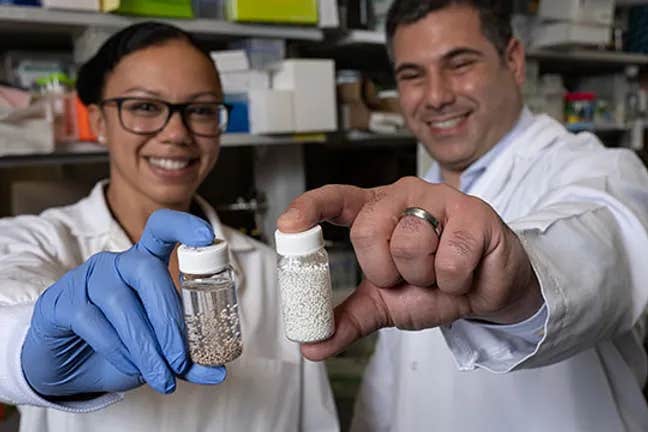Lifechanging treatment destroys advanced-stage cancers in only 6 days
Medical researchers have shown they can eradicate advanced-stage mesothelioma tumors in just a few days via cytokine “drug factory” implants

Study authors Amanda Nash and Omid Veiseh with their “drug factory” beads. Nash, Veiseh and colleagues showed the implants could eradicate ovarian and colorectal cancer in mice in as little as six days. (CREDIT: Jeff Fitlow/Rice University)
Researchers from Rice University and Baylor College of Medicine have demonstrated a groundbreaking treatment that eradicates advanced-stage mesothelioma tumors in mice within just a few days. This innovative approach combines Rice’s cytokine “drug factory” implants with a checkpoint inhibitor drug, showing promising results in preclinical trials.
The treatment involves tiny drug-producing beads, each no larger than a pinhead, which are implanted near tumors. These beads continuously release high doses of interleukin-2 (IL-2), a natural compound that activates white blood cells to fight cancer.
The recent study, published in Clinical Cancer Research, adds to the growing list of successes for this drug-factory technology, developed in the lab of Rice bioengineer Omid Veiseh. This technology has already received FDA approval for clinical trials, set to begin this fall with ovarian cancer patients.
Amanda Nash, a graduate student at Rice, has been instrumental in developing this implant technology alongside fellow student and co-lead author Samira Aghlara-Fotovat. Nash explains, “From the beginning, our objective was to develop a platform therapy that can be used for multiple different types of immune system disorders or different types of cancers.”
The cytokine factories themselves are tiny alginate beads loaded with tens of thousands of cells genetically engineered to produce IL-2. These beads, just 1.5 millimeters wide, can be implanted through minimally invasive surgery, delivering potent doses of IL-2 directly to tumors. In the mesothelioma study, these beads were strategically placed beside tumors and within the pleura, a thin tissue layer covering the lungs and lining the chest wall.
Dr. Bryan Burt, professor and chief of Baylor’s Division of Thoracic Surgery, is deeply involved in this research. He notes the challenges of treating malignant pleural mesothelioma, an aggressive cancer of the lung lining that is difficult to remove completely through surgery.
“Often, there is residual disease left behind,” Burt explains. “The treatment of this residual disease with local immunotherapy — delivering high doses of immunotherapy directly to the pleural space — is a very attractive way to treat this disease.”
Related Stories
The collaboration between Rice and Baylor began after Burt and Dr. Ravi Ghanta, a Baylor surgeon and associate professor, learned about the early success of Veiseh’s ovarian cancer animal tests. These tests, conducted with collaborators at the University of Texas MD Anderson Cancer Center, showed that IL-2-producing beads could eliminate advanced-stage ovarian and colorectal tumors in mice in less than a week. Burt and Ghanta were impressed and curious if the same system could be applied to mesothelioma.
Mesothelioma is a cancer that occurs in the tissue linings surrounding and protecting internal organs, with around 80% of cases linked to prolonged asbestos exposure. Immunotherapy, particularly with drugs known as checkpoint inhibitors, has shown some success in treating this cancer. These inhibitors don’t kill cancer cells directly but instead train the immune system to recognize and destroy them.
In the mesothelioma study, the research team tested the drug factory implants both alone and in combination with a checkpoint inhibitor targeting the PD-1 protein. When used by themselves, the implants eliminated tumors in over 50% of the treated animals. Remarkably, in the group treated with both the drug factory implants and the PD-1 checkpoint inhibitor, tumors were completely destroyed in all seven mice.
Burt emphasizes the significance of these findings, saying, “It’s very hard to treat mesothelioma tumors in mice, just as it is in humans. Our data show that the regional delivery of these immunotherapy particles to mice with mesothelioma produces very effective treatment responses. I’ve never seen such efficacy in eradicating mesothelioma tumors in mice as we have in this model.”
The study’s results also suggest that combining IL-2-producing implants with anti-PD-1 checkpoint inhibitors might effectively train “memory T cells.” These cells could potentially reactivate the immune system to fight mesothelioma if the cancer returns.
Looking ahead, Veiseh mentions that Avenge Bio, a spinout company, has received FDA clearance to treat ovarian cancer patients using these IL-2 cytokine factories. “In the next couple of months, they expect to begin treating patients with these IL-2 cytokine factories,” Veiseh says.
Additionally, the promising preclinical data from this latest study have laid the groundwork for a second clinical trial aimed at patients with mesothelioma and other lung cancers with pleural metastasis. Veiseh shares that meetings with the FDA have taken place, and the trial is expected to begin in the latter half of 2023.
Beyond cancer research, Veiseh and Ghanta have secured a grant from the American Heart Association to explore the potential of cytokine implants in healing heart injuries caused by heart attacks. This research could open new avenues for treating heart disease, further demonstrating the versatility and potential of this innovative technology.
Note: Materials provided above by The Brighter Side of News. Content may be edited for style and length.
Like these kind of feel good stories? Get The Brighter Side of News' newsletter.
Joseph Shavit
Head Science News Writer | Communicating Innovation & Discovery
Based in Los Angeles, Joseph Shavit is an accomplished science journalist, head science news writer and co-founder at The Brighter Side of News, where he translates cutting-edge discoveries into compelling stories for a broad audience. With a strong background spanning science, business, product management, media leadership, and entrepreneurship, Joseph brings a unique perspective to science communication. His expertise allows him to uncover the intersection of technological advancements and market potential, shedding light on how groundbreaking research evolves into transformative products and industries.



